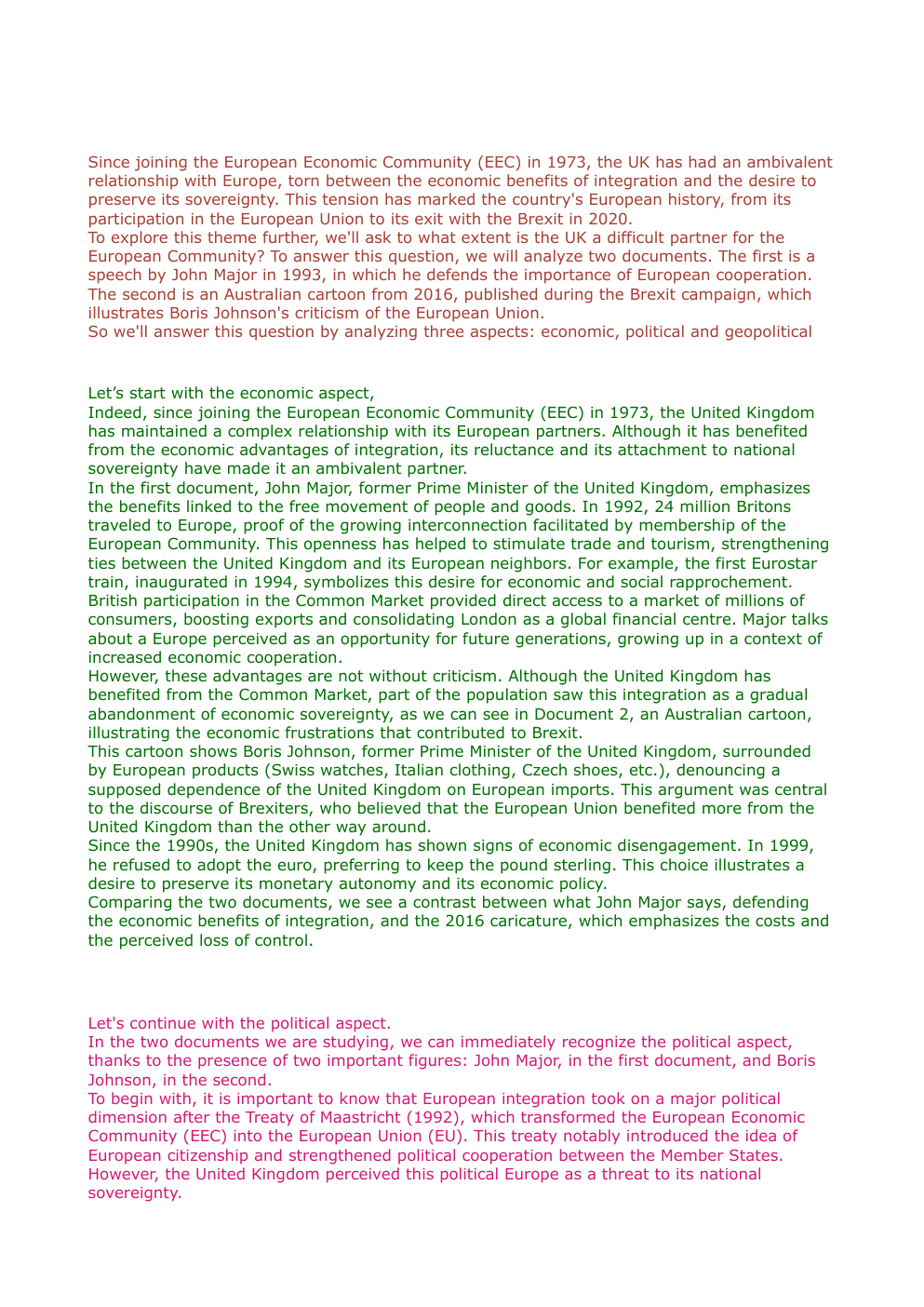DNL anglais
Publié le 22/05/2025
Extrait du document
«
Since joining the European Economic Community (EEC) in 1973, the UK has had an ambivalent
relationship with Europe, torn between the economic benefits of integration and the desire to
preserve its sovereignty.
This tension has marked the country's European history, from its
participation in the European Union to its exit with the Brexit in 2020.
To explore this theme further, we'll ask to what extent is the UK a difficult partner for the
European Community? To answer this question, we will analyze two documents.
The first is a
speech by John Major in 1993, in which he defends the importance of European cooperation.
The second is an Australian cartoon from 2016, published during the Brexit campaign, which
illustrates Boris Johnson's criticism of the European Union.
So we'll answer this question by analyzing three aspects: economic, political and geopolitical
Let’s start with the economic aspect,
Indeed, since joining the European Economic Community (EEC) in 1973, the United Kingdom
has maintained a complex relationship with its European partners.
Although it has benefited
from the economic advantages of integration, its reluctance and its attachment to national
sovereignty have made it an ambivalent partner.
In the first document, John Major, former Prime Minister of the United Kingdom, emphasizes
the benefits linked to the free movement of people and goods.
In 1992, 24 million Britons
traveled to Europe, proof of the growing interconnection facilitated by membership of the
European Community.
This openness has helped to stimulate trade and tourism, strengthening
ties between the United Kingdom and its European neighbors.
For example, the first Eurostar
train, inaugurated in 1994, symbolizes this desire for economic and social rapprochement.
British participation in the Common Market provided direct access to a market of millions of
consumers, boosting exports and consolidating London as a global financial centre.
Major talks
about a Europe perceived as an opportunity for future generations, growing up in a context of
increased economic cooperation.
However, these advantages are not without criticism.
Although the United Kingdom has
benefited from the Common Market, part of the population saw this integration as a gradual
abandonment of economic sovereignty, as we can see in Document 2, an Australian cartoon,
illustrating the economic frustrations that contributed to Brexit.
This cartoon shows Boris Johnson, former Prime Minister of the United Kingdom, surrounded
by European products (Swiss watches, Italian clothing, Czech shoes, etc.), denouncing a
supposed dependence of the United Kingdom on European imports.
This argument was central
to the discourse of Brexiters, who believed that the European Union benefited more from the
United Kingdom than the other way around.
Since the 1990s, the United Kingdom has shown signs of economic disengagement.
In 1999,
he refused to adopt the euro, preferring to keep the pound sterling.
This choice illustrates a
desire to preserve its monetary autonomy and its economic policy.
Comparing the two documents, we see a contrast between what John Major says, defending
the economic benefits of integration, and the 2016 caricature, which emphasizes the costs and
the perceived loss of control.
Let's continue with the political aspect.
In....
»
↓↓↓ APERÇU DU DOCUMENT ↓↓↓


